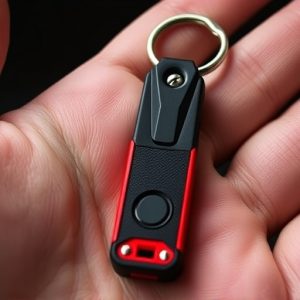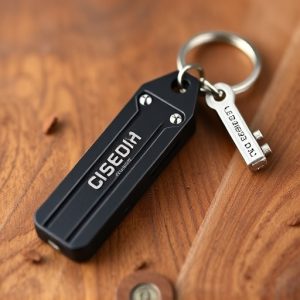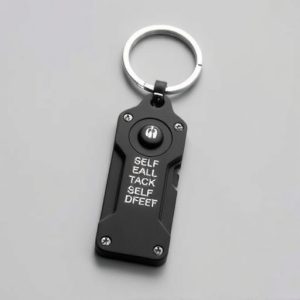Self-Defense Keychains: Legal Requirements and Choosing the Strongest Material
Self-defense keychains, governed by specific laws, must meet criteria for material strength and inte…….
Self-defense keychains, governed by specific laws, must meet criteria for material strength and intended use. The strongest materials include high-grade steel, durable aluminum, and advanced composites, offering durability and sharp edges. However, state laws vary widely in the US, affecting legality based on design, length, and functionality. Understanding local regulations is crucial when carrying a self-defense keychain for personal safety, balancing effectiveness with legal compliance.
In today’s world, understanding self-defense options is crucial. One often overlooked yet powerful tool is the self-defense keychain—a compact, legal defense mechanism that can provide peace of mind in various situations. This article navigates the intricate landscape of self-defense keychains, delving into their legal definitions, material considerations, and state regulations. We explore why choosing the strongest material for maximum effectiveness is a balancing act between power and legality.
- Understanding Self-Defense Keychains: Legal Definitions and Purposes
- Material Considerations for Maximum Effectiveness
- State Laws Regulating Self-Defense Tools: A Comprehensive Overview
- Legal Implications of Using a Self-Defense Keychain
- Choosing the Strongest Material: A Balancing Act Between Power and Legality
Understanding Self-Defense Keychains: Legal Definitions and Purposes
Self-defense keychains are small, portable tools designed to offer immediate protection in dangerous situations. They are typically equipped with sharp edges or points that can deter or disable an attacker, allowing users to escape and seek help. Understanding the legal definitions and purposes of these devices is crucial before considering their acquisition and use.
In many jurisdictions, self-defense keychains fall under specific regulations governing weapons and defense tools. The law often differentiates between self-defense mechanisms based on their potential for harm and intended use. Keychains designed for legitimate self-defense must meet certain criteria to be considered legal. These include factors like the material used, which should be the strongest available to ensure effectiveness while minimizing injury risk. Materials like high-quality stainless steel or even ceramic are often preferred due to their durability and ability to withstand impact without breaking.
Material Considerations for Maximum Effectiveness
When considering the strongest self-defense keychain material, the focus should be on durability, sharp edges, and ease of use. Stainless steel keychains are a popular choice due to their robust build and ability to cause significant harm if needed. Look for options made from high-quality stainless steel with a high nickel content for enhanced strength and corrosion resistance.
Another excellent material is aluminum alloy, known for its lightweight yet sturdy nature. These keychains often feature sharp edges and can be easily carried without adding considerable weight to your keys. The best self-defense keychains should also incorporate features like a durable spring mechanism or a simple flip design that allows for quick deployment, ensuring maximum effectiveness in an emergency situation.
State Laws Regulating Self-Defense Tools: A Comprehensive Overview
State laws governing self-defense tools vary significantly across the US, with each state having its own set of regulations and restrictions. When it comes to self-defense keychains, understanding these legal requirements is essential for ensuring compliance and personal safety. The legality of carrying a self-defense keychain depends on several factors, including the state you reside in, as well as the specific design and material composition.
Many states allow the possession of certain types of self-defense tools, such as keychains equipped with a strong metal prong or sharp edge, as long as they are used responsibly and for lawful purposes. The strongest self-defense keychain material often includes high-grade steel, durable aluminum, or even advanced composite materials designed to withstand impact and provide effective protection. It’s crucial to review your state’s specific laws regarding the length, locking mechanism, and overall functionality of such devices to ensure they meet the legal standards for self-defense tools.
Legal Implications of Using a Self-Defense Keychain
Using a self-defense keychain, especially those made from the strongest materials like high-grade steel or advanced composite substances, can have significant legal implications. While many states in the US allow citizens to carry self-defense tools for personal safety, there are strict rules regarding what constitutes acceptable defense equipment. Keychains designed for self-defense must adhere to specific regulations, which vary across jurisdictions. These regulations cover factors like the size and capacity of the device, its ease of use, and the circumstances under which it can be employed legally.
Carrying a self-defense keychain could potentially remove some legal barriers compared to larger weapons, but it’s crucial to understand local laws. Some states might require individuals to have a permit for certain types of defense tools, while others may have restrictions on when and where these devices can be used. Individuals should also be aware of the difference between using a self-defense keychain as a last resort to protect against an imminent threat versus using it in a way that could escalate a situation or result in unnecessary harm to another person.
Choosing the Strongest Material: A Balancing Act Between Power and Legality
Choosing the right material for a self-defense keychain involves a delicate balancing act between power and legality. The strongest self-defense keychain material should offer effective protection without crossing into illegal or dangerous territory. High-quality metals like steel, aluminum, or titanium are popular choices due to their durability and strength. However, states have varying laws regarding the use of force for self-defense, including restrictions on the type and size of weapons allowed.
For example, while a sturdy keychain made of hardened steel may provide a powerful defense tool, it’s crucial to ensure its length and weight fall within legal limits. Some states prohibit carrying certain types of knives or sharp objects as self-defense tools, so understanding local regulations is paramount. The strongest material isn’t always the best option if it violates laws designed to protect public safety. Therefore, when selecting a keychain for self-defense, prioritize materials that offer robust protection while adhering strictly to legal guidelines.
When selecting a self-defense keychain, it’s crucial to balance effectiveness with legality. Understanding state laws regulating these tools is essential, as different materials may be subject to restrictions. The strongest material for maximum defensive capabilities should also align with legal requirements to ensure its usability in case of an emergency. Prioritizing both safety and adherence to regulations will empower individuals to make informed choices when it comes to personal protection.


